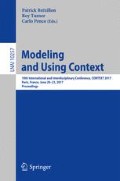Abstract
In this paper we provide a formal model for occasion-sensitive semantics motivated by so called ‘Travis cases’ (Travis 1978, 2000, 2008, 2009). We suggest that understanding of an utterance of \( \varphi \) (knowing its truth conditions) can be modelled as a twofold partitioning of worlds in logical space, where the initial partition is induced by the context-invariant meaning of the sentence uttered and the latter on the basis of context-dependent goals. Our model uses only a single parameter to capture occasion-sensitivity of sentences: practical goals.
Access this chapter
Tax calculation will be finalised at checkout
Purchases are for personal use only
Notes
- 1.
In the literature these are known as Travis cases (sometimes referred to as context-shifting arguments, see Cappelen and Lepore (2008). For critical discussion see Hansen (2011), Hansen and Chemla (2013), Predelli (2005), Vicente (2012), Vicente (2015), Kennedy and McNally (2010), Rothschild and Segal (2009), MacFarlane (2009).
- 2.
Travis (2008): 111.
- 3.
We use the sign # to indicate that the response is in some sense inadequate or infelicitous, and that what is said is intuitively false.
- 4.
Travis (2000).
- 5.
Travis 2009: 119–120.
- 6.
- 7.
The phenomenon exhibited in Travis cases has thus far been analysed as a form of lexical ambiguity or polysemy (Fodor 2003; Vicente 2015; Carston 2010), structural ambiguity (Kennedy and McNally 2010), conversational implicature (Cappelen and Lepore 2008; Fodor 2003), circumstance of evaluation dependence (MacFarlane 2009; Predelli 2005), pragmatic modulation (Pagin 2005, Recanati 2012, Carston 2010) and (hidden) indexicality (Szabó 2001; Rothschild and Segal 2009.
- 8.
See Recanati (2007).
- 9.
Reference is usually made to the speaker’s intentions or the topic of conversation, without going into details of how or why these are able to determine correctness of selecting a certain function and not other. According to MacFarlane, “the counts-as parameter will be determined in complex ways by other features of the context, including the topic of conversation and the speaker’s intentions” (Macfarlane 2007: 246).
- 10.
The model we are about to propose can be extended to interrogatives and imperatives, although this is beyond the scope of this paper.
- 11.
In our diagram the world (01) is thus not fit for the botanist’s goal.
- 12.
This idea of communication is based on Wittgenstein et al. (2009).
- 13.
References
Austin, J.L.: How to Do Things with Words. Oxford University Press, Oxford (1975)
Borg, E.: Minimal Semantics. Cambridge University Press, Cambridge (2004)
Borg, E.: Pursuing Meaning. Oxford University Press, Oxford (2012)
Cappelen, H., Lepore, E.: Insensitive Semantics: A Defense of Semantic Minimalism and Speech Act Pluralism. Wiley, Hoboken (2008)
Carston, R.: Thoughts and Utterances: The Pragmatics of Explicit Communication. Wiley, Hoboken (2002)
Carston, R.: Explicit communication and free pragmatic enrichment. In: Soria, B., Romero, E. (eds.) Explicit Communication, pp. 217–285. Springer, Heidelberg (2010)
Fodor, J.A.: Hume Variations. Cambridge University Press, Cambridge (2003)
Frege, G.: The thought: a logical inquiry. Mind 65, 289–311 (1956)
Hansen, N.: Color adjectives and radical contextualism. Linguist. Philos. 34(3), 201–221 (2011)
Hansen, N., Chemla, E.: Experimenting on contextualism. Mind Lang. 28(3), 286–321 (2013)
Kennedy, C., McNally, L.: Color, context, and compositionality. Synthese 174(1), 79–98 (2010)
MacFarlane, J.: Semantic minimalism and nonindexical contextualism. In: Context-Sensitivity and Semantic Minimalism: New Essays on Semantics and Pragmatics, pp. 240–250 (2007)
MacFarlane, J.: Nonindexical contextualism. Synthese 166(2), 231–250 (2009)
Pagin, P.: Compositionality and context. In: Contextualism in Philosophy, pp. 303–348 (2005)
Pagin, P., Pelletier, J.: Content, context and composition. In: Content and Context. Essays on Semantics and Pragmatics, pp. 25–62 (2007)
Pietroski, P.: Meaning before truth (2005)
Predelli, S.: Painted leaves, context, and semantic analysis. Linguist. Philos. 28(3), 351–374 (2005)
Recanati, F.: Literal Meaning. Cambridge University Press, Cambridge (2004)
Recanati, F.: Perspectival Thought: A Plea for (Moderate) Relativism. Oxford University Press, Oxford (2007)
Recanati, F.: Compositionality, semantic flexibility, and context-dependence. Oxford Handbook of Compositionality, pp. 175–192 (2012)
Rothschild, D., Segal, G.: Indexical predicates. Mind Lang. 24(4), 467–493 (2009)
Stalnaker, R.: Context and Content Essays on Intentionality in Speech and Thought. Oxford University Press, Oxford (1999)
Stanley, J.: Semantics in context. In: Contextualism in Philosophy: Knowledge, Meaning, and Truth, pp. 221–253 (2005)
Szabó, Z.G.: Adjectives in context. Pragmatics and Beyond New Series, pp. 119–146 (2001)
Travis, C.: Meaning versus truth. Dialogue 17(03), 401–430 (1978)
Travis, C.: Unshadowed Thought: Representation in Thought and Language. Harvard University Press, Cambridge (2000)
Travis, C.: Insensitive semantics. Mind Lang. 21(1), 39–49 (2006)
Travis, C.: Occasion-Sensitivity: Selected Essays. Oxford University Press, Oxford (2008)
Travis, C.: Thought’s Footing: A Theme in Wittgenstein’s Philosophical Investigations. Oxford University Press, Oxford (2009)
Vicente, A.: On travis cases. Linguist. Philos. 35(1), 3–19 (2012)
Vicente, A.: The green leaves and the expert: polysemy and truth-conditional variability. Lingua 157, 54–65 (2015)
Wittgenstein, L., Anscombe, G.E.M., Hacker, P.M.S., Schulte, J.: Philosophical Investigations. Wiley, Hoboken (2009)
Author information
Authors and Affiliations
Corresponding author
Editor information
Editors and Affiliations
Rights and permissions
Copyright information
© 2017 Springer International Publishing AG
About this paper
Cite this paper
Dobler, T. (2017). Occasion-Sensitive Semantics. In: Brézillon, P., Turner, R., Penco, C. (eds) Modeling and Using Context. CONTEXT 2017. Lecture Notes in Computer Science(), vol 10257. Springer, Cham. https://doi.org/10.1007/978-3-319-57837-8_20
Download citation
DOI: https://doi.org/10.1007/978-3-319-57837-8_20
Published:
Publisher Name: Springer, Cham
Print ISBN: 978-3-319-57836-1
Online ISBN: 978-3-319-57837-8
eBook Packages: Computer ScienceComputer Science (R0)

